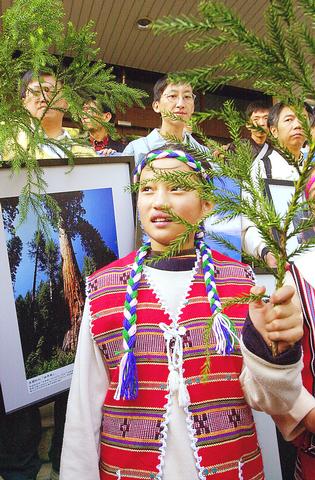Dozens of children, accompanied by conservationists, presented tree saplings (
Dressed in traditional clothes, Han and Atayal tribe (

PHOTO: CHEN CHENG-CHANG, TAIPEI TIMES
The children later walked to the Presidential Office to present saplings to the president, but Chen was unable to meet with the group because he was in southern Taiwan. As the children sang Christmas songs, the saplings were accepted by Kuo Yao-chi (郭瑤琪), director of the Department of Public Affairs of the Presidential Office.
Activists who accompanied the children called for the establishment of Chilan Mountain National Park, saying that Christmas Day especially was an appropriate day to appreciate one of the gifts given by the God to Taiwanese people -- the only extensive and homogenous Taiwanese red and yellow cypress (
Conservationists urged the government to establish a national park on Chilan Mountain based on a new concept, which combines aboriginal culture with Western forest management.
Activists said they have learned from their efforts over the past few years that forest-related problems will not be solved until Aborigines can live in mountainous areas.
The controversy over the establishment of Chilan Mountain National Park emerged several years ago when environmentalists grew upset with what they called the government's "ironic forestry policy," so deemed because Taiwan's Forest Protection Department once supported logging. The government believed that the more logging there was, the richer the country would be. Activists, therefore, called for the preservation of trees, claiming that the government had logged 44 million cubic meters of trees from 1945 to 1989.
According to conservationists, due to the lack of balance between timber harvesting and protection of ecosystems, the Forest Protection Department under the Vocational Assistance Commission for Retired Servicemen (退輔會) had logged 6,000 hectares of red and yellow cypress trees over the past 30 years in the Chilan Mountain region, the location of the sources of water supplies to half of Taiwan's population.
Under pressure from environmentalists, a ban on logging in mountain areas was announced officially in 1989. But by then many Aborigines had been forced to relocate and leave their traditional place of residence.
Just this week Aboriginal groups joined together with environmentalists to express their support for the establishment of a national park at Chilan Mountain. They suggested the park be called Magou Mountain (馬告山) in the Atayal language, stressing that the process of planning a national park should include opinions from Aboriginal and other local residents.
Other Aboriginal groups, however, are opposed to the idea. They said that the National Park Act is in need of revision. Existing laws prohibit individuals from entering some areas in national parks.
Some Aboriginal people said at a public hearing at the Legislative Yuan early this month that, as long as they were allowed to enter the park freely, they did not mind the government managing the forests.

The Ministry of the Interior (MOI) is to tighten rules for candidates running for public office, requiring them to declare that they do not hold a Chinese household registration or passport, and that they possess no other foreign citizenship. The requirement was set out in a draft amendment to the Enforcement Rules of the Public Officials Election and Recall Act (公職人員選舉罷免法 ) released by the ministry on Thursday. Under the proposal, candidates would need to make the declaration when submitting their registration forms, which would be published in the official election bulletin. The move follows the removal of several elected officials who were

The Republic of China (ROC) is celebrating its 114th Double Ten National Day today, featuring military parades and a variety of performances and speeches in front of the Presidential Office in Taipei. The Taiwan Taiko Association opened the celebrations with a 100-drummer performance, including young percussionists. As per tradition, an air force Mirage 2000 fighter jet flew over the Presidential Office as a part of the performance. The Honor Guards of the ROC and its marching band also heralded in a military parade. Students from Taichung's Shin Min High School then followed with a colorful performance using floral imagery to represent Taiwan's alternate name

COVETED PRIZE: The US president would be a peace prize laureate should he persuade Xi Jinping to abandon military aggression against Taiwan, William Lai said US President Donald Trump should get the Nobel Peace Prize should he be able to convince Chinese President Xi Jinping (習近平) to abandon the use of force against Taiwan, President William Lai (賴清德) told a conservative US radio show and podcast in an interview. The US is Taiwan’s most important international backer, despite the absence of formal ties, but since Trump took office earlier this year he has not announced any new arms sales to the nation. Trump could meet Xi at the APEC summit in South Korea on Oct. 31 and Nov. 1. Lai, speaking on The Clay Travis and Buck Sexton

A Chinese takeover of Taiwan would severely threaten the national security of the US, Japan, the Philippines and other nations, while global economic losses could reach US$10 trillion, National Security Council Deputy Secretary-General Lin Fei-fan (林飛帆) wrote in an article published yesterday in Foreign Affairs. “The future of Taiwan is not merely a regional concern; it is a test of whether the international order can withstand the pressure of authoritarian expansionism,” Lin wrote in the article titled “Taiwan’s Plan for Peace Through Strength — How Investments in Resilience Can Deter Beijing.” Chinese President Xi Jinping’s (習近平) intent to take Taiwan by force